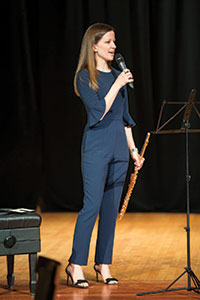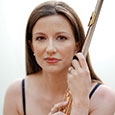I have always been interested in stand-up comedy. My experience with it resembles the early stages of my flute life, complete with ups and downs, feelings of certainty, and shortly after that, feelings of giving up. I now realize there is always something to learn, and that is part of the reason I enjoy it – just like flute playing.
It was not until 2009 that I started to do something about my interest. While subbing with the Detroit Symphony, a friend from the orchestra convinced me to perform at a Moth StorySLAM. The Moth is an NPR podcast where people tell stories with a theme, time limit, and no notes. That night the theme was blunders. I performed a five-minute story about a tour I went on with the Swedish Radio and then a tie-breaker round about a first date with a French mime actor. I won the slam!
Back home in Chicago, I started going to open mics and story slams on a regular basis. Just as I was starting to progress, I got a job in central Missouri. Since then I have taken several online comedic songwriting and sketch comedy-writing classes through Second City Chicago and attended a comedic improv retreat in Wisconsin.
In August of 2019, I decided to really go for it: I enrolled in an online stand-up comedy class where the weekly assignment was to post a three- to five-minute set. This meant I needed to find open-mic events in my area as well as wherever I was traveling. Since then I have performed in Las Vegas, Kansas City, and St. Louis.
As I meet more local comics, I am constantly reminded of my basic guidelines to flute playing. These are little bits of wisdom I have accrued over the years that always prove to be true. It turns out they work with comedy, too.

What you do every day is more important than what you do sometimes.
I loved the challenge of posting a video each week but I was also overwhelmed. Not only was I practicing flute and teaching, I was writing new material for the next stand-up assignment. I kept putting off the writing part because I felt that I did not have any funny ideas, even with writing exercises the instructor of the course suggested.
That was like deciding I was not going to practice flute today because I did not think I had good ideas or because yesterday’s session didn’t go well. With that mindset, I realized that I would never get anything done. I needed to write every day and dig deeper into characters, observations, and one-liners.
In comedy, punchlines should be surprising. First attempts at this may not land. For example, I used voice-fry as part of a character in one of my sets. I compared her to one of the Kardashians but that line did not seem to get a laugh. The revision process led me to try the nickname Kartrashians, and then the line worked.

Just because you are good at something does not mean you should utilize it as much as possible.
When I learned how to taper a note on the flute, it became an obsession. Any chance I had, I tapered. At one point, I heard a recording of one of my recent performances and noticed that most of these tapers had nothing to do with the context. They sounded habitual and were distracting. I realized that if I saved my new skill for places where it made sense, it would be more impressive and contribute to my interpretation.
In comedy, I love playing characters in a set. I am a mimic and like to see how ridiculous I can make them. However, I have started to notice they do not always contribute to the joke. One of my favorite comedians, John Mulaney, is really good at impersonations but he does not use them very often. When he does, they are spot on and heighten the joke. Another comedian, Maria Bamford, does impressions throughout her act, but her jokes are based on these characters, so she gets the laughs.
The best flutists play every note with direction and a main musical goal in mind. When I record myself, I make sure my vibrato enhances the direction of the line and that I do not bring out details so much that they distract from the next musical goal. In other words, every note I play contributes to the destination.
If you watch Tig Notaro, Dave Chappelle, or Jim Gaffigan’s Netflix specials, there is not one word that does not contribute to a joke. They have not memorized their set word for word, but they are keeping the main points in mind and highlighting small observations and anecdotes along the way, increasing the tension of the build-up.
It’s beginner’s luck when you perform well but are not sure why. You are advancing when you understand what made it good.
The last week of my online class included an optional assignment: post a five-minute set in your chosen style. As I was waiting to be introduced in a club in St. Louis, I realized that some of my material was not relatable for this audience. Somehow I came up with a new opener and changed the order of my material – ten minutes before they called my name. It turned out to be the one of my best sets. Most of my jokes seemed to land and I felt good on stage.
I took my newly revised set to another club, this time in Kansas City. The owner and I talked a little before he introduced the first comic, and I found myself trying a couple jokes in conversation to see if they got a laugh. They did. Based on this, I felt that my set would go well. Instead, I completely bombed that night. I may have gotten a couple of chuckles but it felt awful.
Because my last set had gone so well, I was very disappointed. I stayed for the rest of the performers and bought a drink to support the venue. Afterwards, I spoke with the owner again, and he asked how I felt it went. I was honest about how bad it was. He seemed relieved to hear this and offered me feedback.
“You didn’t give the audience any context. Anyone here could have told those jokes. You didn’t give them your perspective. You should have explained your background like you did when we were talking. That’s what made your jokes funny.”
Know the material so well that you can’t wait to perform it.
As a flutist, this was something I had struggled with in my mid-twenties. I was taking lots of orchestral auditions and grew concerned about being correct. I wanted all of the excerpts on the list to be right. I am not sure what led me to focus on this but looking back, I wanted a job so badly that I did not want to mess up my chances. Just as in my disastrous performance, I wanted all to go smoothly, and followed my script exactly rather than adjusting to the flow of the performance.
A pitfall in both comedy and flute playing is to focus on the prize rather than the craft. As I grew out of this and discovered my interpretation of the excerpts, things started to click. That is part of the process for learning any art form: trust your instincts as long as they are based on something. That is what will make your performance good.
Learn to embrace the process.
The first run-through of a new piece never feels very good to me. As a student, I avoided this because I did not want to experience that feeling. I have learned to accept that parts of learning something new may not feel great. As a result, I am more prepared and know how to practice so I can count on it getting better. It is all part of the process.
It took a lot of experience to understand these basics on the flute. I expect it to take some time in comedy as well. What I especially enjoy, however, is that all of it feels vaguely familiar. Through honing another craft, I am throwing out some negative thoughts I let slip in during high school and college, and ultimately I think that both my music and comedy will benefit. I have got to stop taking myself so seriously!






